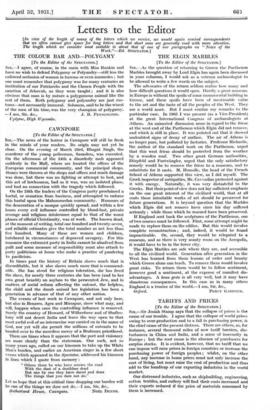CAWNPORE
[To the Editor of the SPECTATOR.]
Stn,—The news of the horror in Cawnpore will still be fresh in the minds of your readers. Its origin may not yet be clear. On the evening of March 23rd, Bhagat Singh, the murderer of the young policeman, Saunders, was executed. On the afternoon of the 24th a disorderly mob appeared suddenly in the Mall, where are located the offices of the European commercial community, and the principal shops.
Stones were thrown at the shops and offices and much damage was done, but there was no fighting or attempt to loot, and this act of lawlessness, bad as it was, was an isolated phase, and had no connection with the tragedy 'which followed.
On the 24th the leaders of the Congress party proclaimed a hartal, or cessation from business, and attempted to enforce this hartal upon the Mahommedan community. Rumours of the desecration of a mosque quickly spread, and within a few hours every evil influence controlled by blood-lust, private revenge and religious intolerance equal to that of the worst phases of official Christianity, was at work. The known dead, at the moment of writing, total one hundred and twenty-seven", and reliable estimates give the total number as not less than five hundred. Many of these are women and children, butchered in circumstances of depraved savagery. For this massacre the extremist party in India cannot be absolved from guilt and some measure of responsibility must also attach to party politicians at home who make a practice of pandering to pacificisin.
In times past the history of Britain shows much that is discreditable, but it also shows much more that is commend- able. She has stood for religious toleration, she' has freed the slave, for nearly three centuries she has been (and to her own great benefit) an asylum to the persecuted Jew, and in matters of social reform affecting the outcast, the helpless, the child and the dumb animal her legislation has been a generation in advance of that of any other nation.
The events of last week in Cawnpore, and not only here, but also in Benares, Agra and Mirzapur, show what may, and will, happen when once the controlling influence is removed. Surely the country of Howard, of Wilberforce and of Shaftes- bury will not desert India and leave the way open to that most awful evil of an internecine war carried on in the name of God, nor yet will she permit the millions of outcasts to be handed over to the merciless mercy of a Brahman priesthood.
There are times when it appears that the poet and visionary see more clearly than the statesman. One such, not so many years ago, called on our kinsmen to take up the White Man's burden, and earlier an American singer in a few short verses which appeared in the Spectator, addressed his kinsmen in lines which I quote from memory :
" Others there be who have strewn the road With the dust of a deathless dead
But one by one they have dared and done The things that you dare not do."
Let us hope that at this critical time dropping our burden will be one of the things we dare not do.—I am, Sir, &c.,
Sutherland House, Cawnpore. NOTIL DEERE.






































 Previous page
Previous page